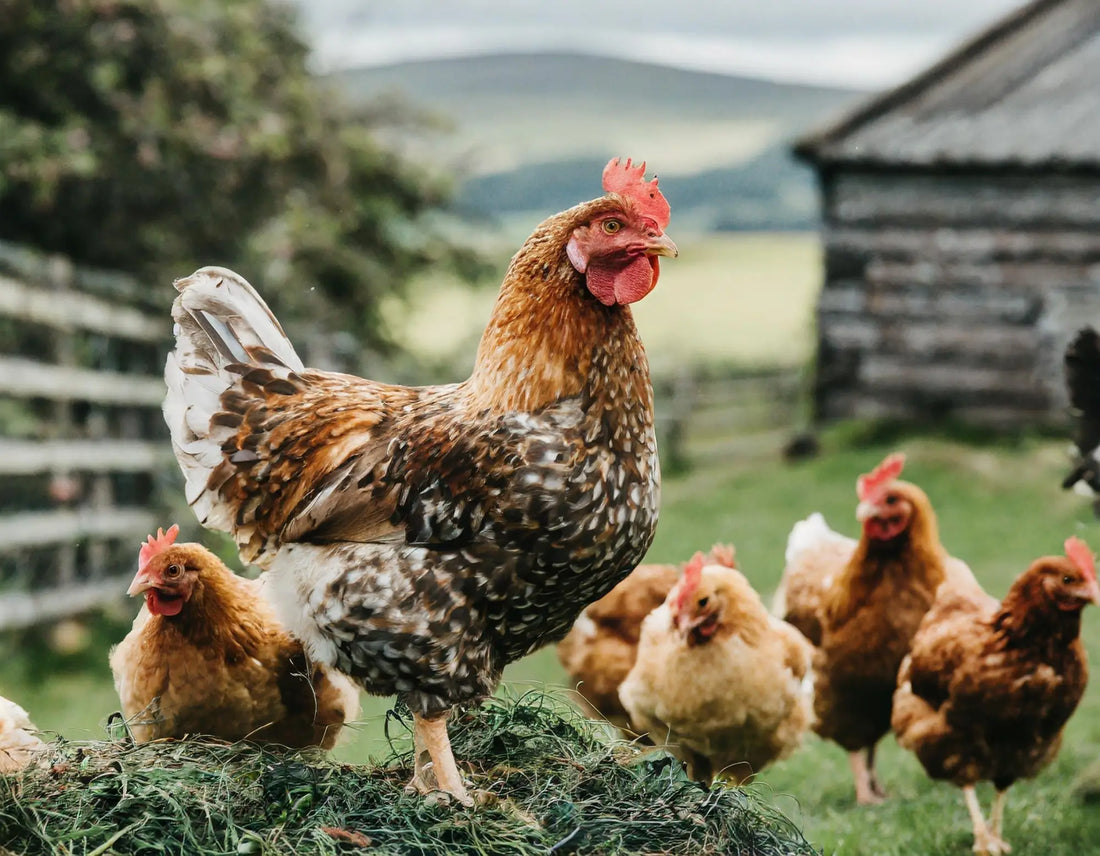
Thinking About Keeping Chickens?
Share
Guide to Keeping Chickens in the UK
Raising chickens can be a highly rewarding experience. Whether you’re interested in fresh eggs, natural pest control, as a source of meat or simply as a hobby, chickens are relatively easy to care for. However, there are specific considerations when keeping chickens in the UK, including legal requirements, proper housing, food, and care. Below is a complete guide to help you get started with keeping chickens.
1. Planning and Preparation
1.1. Legal Requirements
Before bringing chickens into your care, it's important to be aware of the relevant legal regulations in the UK.
- Registration: If you have more than 50 birds, you must register your poultry with the Animal and Plant Health Agency (APHA). This is part of the UK’s effort to monitor and control diseases like avian influenza.
- Free-range standards: If you are planning on running a free-range flock commercially, you must comply with the standards set by the government.
- Noise and Nuisance Regulations: Chickens can sometimes be noisy, especially roosters. Before setting up your coop, check your local council's noise and nuisance regulations to avoid any complaints from neighbors.
1.2. Choosing the Right Breed
The breed of chicken you choose will depend on your goals and the space available. Popular UK chicken breeds include:
- Hybrid Layers: These are crossbreeds, bred specifically for egg production, such as the Isa Brown or Lohmann Brown. They are good for first-time keepers and tend to be friendly and productive.
- Heritage Breeds: If you are looking for a more natural, traditional breed, you can opt for British heritage breeds such as the Sussex, Rhode Island Red, or Marans. They can be slower to mature but offer great meat and egg quality.
- Ornamental Breeds: If you are looking for chickens that are more for aesthetic reasons, consider ornamental breeds like the Silkie or Polish.
1.3. Choosing Your Space
- Garden Size: Chickens need sufficient space to roam. Ideally, you should aim for at least 1 square meter per chicken inside the coop and 2 square meters per bird in the run. If you are planning to keep more than a few birds, ensure your garden is large enough.
- Secure Fencing: If you do not want your flock to wander, make sure your garden is fully enclosed with secure fencing. Chickens are very good at scratching and pecking at things to fence off anything you don't want your chickens getting at. You’ll also want to ensure predators (foxes, dogs, etc.) cannot easily access them.
2. Housing Your Chickens
2.1. Chicken Coop
A chicken coop is essential for keeping your chickens safe from predators and giving them a space to sleep at night. Here’s what you need:
- Ventilation: Ensure the coop has good ventilation to avoid overheating and humidity buildup. Proper airflow helps keep the coop clean and prevents respiratory issues.
- Nesting Boxes: Chickens need nesting boxes where they can lay their eggs. These should be placed in a quiet corner of the coop. Aim for one box per 3-4 hens.
- Roosting Bars: Chickens prefer to roost off the ground at night, so provide sturdy roosting bars or branches for them to perch on.
- Dry Bedding: Use straw, wood shavings, or other absorbent materials for bedding to help absorb waste and keep the coop dry. Change bedding regularly to reduce smell and prevent illness.
2.2. Chicken Run
The run is the area where your chickens can roam during the day if you are not allowing them to free-range. It should be:
- Secure: Chicken wire or mesh should be strong and securely attached to prevent predators from getting in. Make sure the wire is buried several inches into the ground to prevent foxes from digging under it.
- Safe from Weather: The run should be sheltered from rain, wind, and direct sun exposure. A simple tarp or wooden structure can provide this.
- Enrichment: Chickens need mental and physical stimulation. Provide scratching posts, dust baths (a shallow container of soil and sand), and some plants to peck at.
3. Feeding and Watering
3.1. Chicken Feed
Chickens require a balanced diet that includes protein, grains, and vitamins. You can buy commercial poultry feed, which is formulated for different stages of growth and egg production.
- Layer Pellets: For hens that are laying eggs, feed them a good quality layer pellet or mash that contains the right amount of calcium for strong eggshells.
- Scratch Grains: Chickens love scratch grains (corn, wheat, and barley), but they should not be fed exclusively on these, as they lack essential nutrients.
- Vegetables: Chickens also enjoy vegetables like lettuce, cabbage, and peas. Avoid feeding them anything too acidic, like citrus fruits, or overly salty foods.
- Grit: Chickens don’t have teeth, so they need grit (small stones or sand) to help them grind their food in their gizzards.
- Treats: Chickens love to be treated to oats, rice, fruits, vegetables, seeds, egg. Treats should be given in moderation.
3.2. Watering
Clean, fresh water should always be available. Chickens can drink a lot, especially in hot weather, so make sure they have easy access to a large enough water container. Ensure their water is regularly checked when it is freezing temperatures to ensure their water supply hasn't frozen over.
Water Additives: You can naturally prevent parasites, infection and improve the health of your chickens by supplementing their water with added crushed garlic, chilli flakes, herbs and apple cider vinegar.
4. Health and Well-being
4.1. Common Health Problems
- Mites and Lice: Chickens can pick up mites or lice, which can cause discomfort and health problems. Regularly check for signs of parasites and treat with a suitable poultry pest control product.
- Infectious Diseases: Be on the lookout for signs of illness such as lethargy, changes in egg production, or coughing. Always consult a vet if you suspect a health issue.
- Egg Peritonitis: This condition can affect laying hens and may cause fluid buildup in the abdomen. It's important to keep an eye on your birds’ behavior and consult a vet if you notice anything unusual.
4.2. Vaccinations
- In the UK, it’s common although not mandatory to vaccinate chickens against diseases like Marek’s Disease, Infectious Bronchitis, and Newcastle Disease.
4.3. Foot Care
Chickens' feet can sometimes become affected by bumblefoot (an infection in the foot pads). Regularly check their feet and keep the coop clean to reduce the risk of infections. Put straw down in their run in the winter to prevent frost bite. Consider keeping your chickens in their run during strong winds or cold temperatures.
5. Egg Production
5.1. Collecting Eggs
- Eggs should be collected at least once a day to ensure they are fresh. Most chickens lay before midday and you will normally hear them "sing" when they have! Store them in a cool, dry place.
- If you want to keep eggs for longer, you can also refrigerate them or use them for baking and cooking. Chickens can lay anywhere from 3 to 14 eggs per week, depending on breed and age.
5.2. Handling Surplus Eggs
If you have more eggs than you can use, consider:
- Selling or giving away extras to friends, family, or neighbors.
- Preserving eggs by freezing them (though this requires cracking them first) or making pickled eggs.
6. Winter Care
Chickens can handle cold temperatures, but they should be protected from drafts and extreme conditions.
- Insulate the Coop: If you live in an area with cold winters, make sure the coop is insulated but still well-ventilated.
- Keep Water from Freezing: Use heated water bowls or regularly check and replace their water to prevent freezing.
- Extra Feed: Chickens may need extra feed in winter as they burn more energy to stay warm.
7. Dealing with Problems and Pests
7.1. Predators
- Foxes: Foxes are a significant threat to backyard chickens in the UK. Make sure the run is secured with strong, buried fencing.
- Rats: Rats may be attracted to food scraps. Keep your coop and feeding areas clean and secure to prevent infestations.
- Birds of Prey: Larger birds of prey may attempt to capture chickens, particularly young or small breeds. Supervise free-range time or provide a secure outdoor space.
8. Handling and Socializing Chickens
Chickens are social animals and will thrive in the company of other hens. However, they can also be a bit skittish, so be gentle when handling them:
- Handling: If you need to pick up a chicken, do so calmly and gently, keeping their wings closed and supporting their body.
- Bonding: Spend time with your chickens daily to help them get used to your presence. They will happily eat out of your hands or follow you around as you are gardening to eat any bugs you expose.
Conclusion
Keeping chickens in the UK is a great way to enjoy fresh eggs, promote sustainable living, and care for animals. By following this guide, you can ensure your chickens are healthy and happy, while also complying with local laws and regulations. Whether you are a beginner or have experience, chickens are a rewarding and enjoyable addition to your life.
